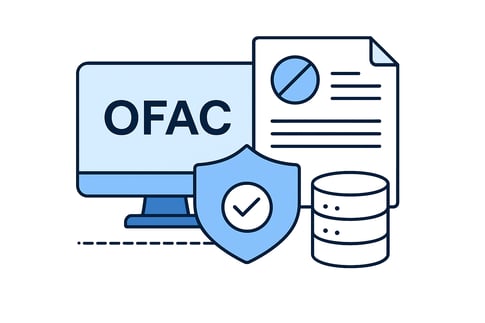How OFAC compliance combines sanctions control with secure data management
The Office of Foreign Assets Control (OFAC) enforces U.S. economic and trade sanctions designed to protect national security and prevent financial crime. Banks, fintechs, and multinational corporations must ensure they do not process transactions or engage with sanctioned entities.
But effective OFAC compliance requires real-time screening across massive data flows — often involving personal and cross-border information.
This creates operational tension between sanctions enforcement and privacy compliance.
OFAC compliance is therefore becoming as much about data governance as it is about risk detection.
OFAC’s core compliance requirements
Organizations subject to U.S. jurisdiction must maintain risk-based sanctions programs covering customers, counterparties, and transactions.
Core elements include:
- Sanctions list screening: checking entities against OFAC’s SDN and non-SDN lists.
- Transaction monitoring: identifying indirect sanctions exposure.
- Licensing and reporting: documenting any authorized dealings with restricted parties.
- Record retention: maintaining verification logs for five years.
- Third-party risk oversight: ensuring vendors also comply with OFAC rules.
These processes mirror AML frameworks under FinCEN but require deeper cross-border data analysis.
Related: See FinCEN for how AML and sanctions programs intersect under U.S. law.
The privacy and compliance conflict
OFAC screening requires continuous data comparison across customer, payment, and trade datasets.
For global institutions operating under GDPR or DORA, sharing and storing such data presents significant privacy risks.
This conflict has led to a growing interest in privacy-preserving computation, which allows encrypted name-matching and sanctions screening without revealing raw identity data.
It enables organizations to:
- Match customer data against sanctions lists privately.
- Maintain full auditability of screening actions.
- Minimize data exposure across subsidiaries and jurisdictions.
- Meet both OFAC and GDPR obligations simultaneously.
Related: Read Confidential computation to understand how cryptography enables lawful screening.
OFAC and RegTech innovation
OFAC’s 2022 compliance framework emphasizes “data accuracy, automation, and auditability” — three elements now driving RegTech innovation.
Financial institutions are modernizing screening processes by integrating AI-driven matching models with encrypted computation.
Emerging RegTech solutions combine:
- Name matching algorithms tuned for global linguistic variations.
- AI-enhanced transaction screening for pattern recognition.
- MPC-based data collaboration across compliance teams.
- Real-time regulatory reporting through verifiable analytics.
This combination ensures that sanctions screening remains both effective and compliant.
Related: See Regulatory Technology (RegTech) for how encrypted analytics are reshaping compliance architecture.
“Sanctions screening is no longer a static list-check. It’s a live data process — and privacy-preserving computation is what makes it sustainable under global law.”
– Director of Financial Crime Technology, Global Sanctions Forum
This reflects the modernization of OFAC compliance — away from static databases toward secure, dynamic verification.
The compliance battlefield: Win the fight
Your firm is facing immense pressure from regulators like the FCA. New regulations like DORA and the upcoming eIDAS 2.0 are turning compliance from a burden into a battlefield. You're expected to manage risk, protect data under strict rules like GDPR, and avoid massive fines. Your current systems are simply not enough. Partisia is your strategic partner in building a more secure and profitable future.

What we solve:
- DORA & GDPR compliance
- eIDAS 2.0 & Digital Identity
and more.
Platform for privacy-preserving OFAC compliance
Partisia enables institutions to modernize OFAC compliance by integrating privacy-preserving data collaboration into sanctions screening systems. Partisia empowers encrypted matching and validation processes between counterparties and regulatory bodies—ensuring privacy is preserved throughout compliance workflows.
With Partisia, organizations can:
- Conduct sanctions screening without revealing customer identities.
- Connect compliance teams securely across borders.
- Maintain verifiable proof of OFAC compliance for audits.
- Align OFAC requirements with GDPR, FATF, and DORA standards.
Partisia bridges regulatory enforcement and privacy protection — turning OFAC compliance into a model for secure, global financial governance.

2025.09.16


